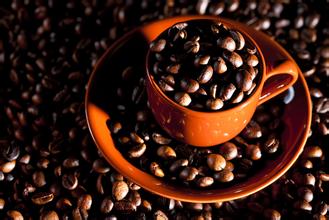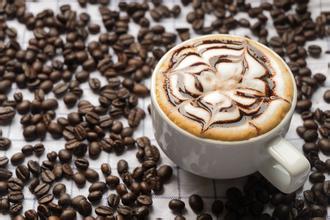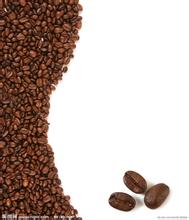Rough grinding suitable for brewing utensils flannel dripping filter pot flavor description introduction of taste production area
Rough grinding suitable for brewing utensils flannel dripping filter pot flavor description introduction of taste production area
1. The water flow of water injection should be stable, and the water flow should not be large or small, intermittent or continuous. You can first use the filter without filter paper and coffee powder to practice the strength and stability of the wrist, remember to feel the rhythm of water injection, the sense of rhythm of brewing, and control the speed and thickness of water flow, which is the key to brewing your own personal style and flavor.
2. If you brew correctly, watch the coffee powder after filtering, it will look like a concave hole. Around the cavity, there will be a thin layer of coffee powder, and there will be some blisters at the bottom of the hole, which means that the coffee is extracted evenly, and no part of the coffee powder is over-extracted.
The taste of follicular coffee is like a gentle gentleman, the taste of Saifeng is like a clean and pure girl, and espresso is like the strength of a gypsy girl, each with its own flavor and style. And for someone who is going to make his first cup of coffee at home, follicular coffee is a good start.
As far as follicular coffee is concerned, it is generally divided into two types: one is filter paper (the color of filter paper is divided into white and brown, it is recommended to use brown, white filter paper is bleached, if the quality is not good, I am afraid it will taste). The other is flannel. Because the pores of the filter paper are small, the taste is thin, and the pores of the filter cloth are larger, the coffee is allowed to pass through more oil and aromatic substances, and the taste is naturally thicker. The brewing temperature is between 95 and 90 degrees, depending on the degree of baking. Adjust the temperature
Each extraction apparatus has its own appropriate degree of grinding, so grinding is not the degree of grinding you want. As I just said, when extracting coffee with filter paper trickling filtration, the coffee powder is too coarse or too fine, which means that the most suitable grinding degree is medium to medium roughness.
Is ultra-thick grinding better? This is also a matter of degree. If the grinding is too rough, the hot water will easily fall through the filter paper, and the delicious ingredients of the coffee will not be fully extracted. In this way, the coffee that falls into the coffee pot will become a mild liquid.
In the process of grinding and extraction, there is an unchanging basic rule, that is, "the finer the grinding degree, the heavier the bitterness, and the thicker the grinding degree, the weaker the bitterness." This is based on the fact that the surface area of coffee powder is covered by hot water. From this, we can know the relationship between the extraction apparatus and the grinding degree of coffee powder.
Espresso coffee, for example, grinds deeply roasted beans and uses an espresso machine to extract a small amount of coffee liquid in a short period of time, resulting in coffee with a strong bitter taste: what about the same coffee powder extracted by filter paper trickling filtration? The result of the actual operation is that the filter paper will be blocked by coffee powder, making it difficult for the injected hot water to pass through, and the extraction time will be lengthened, which will eventually lead to excessive extraction.

Important Notice :
前街咖啡 FrontStreet Coffee has moved to new addredd:
FrontStreet Coffee Address: 315,Donghua East Road,GuangZhou
Tel:020 38364473
- Prev

Is the sour coffee about deep roasting or light roasting?
1, shallow baking (Light) the most light fried culture, no flavor and concentration to speak of, beans are not yet ripe, with the green taste of raw beans, not suitable for grinding and drinking. It's usually used as an experiment. 2. Deep shallow baking (Cinnamon) is also known as cinnamon baking, which is generally popular and has a strong sour taste. The color of beans is quite similar to that of cinnamon, so it is also called cinnamon baking, sour.
- Next

The difference between the mocha article and the coffee machine
The difference between the practice of mocha Coffee articles and Coffee machines in the tenth and fifth century, some coffee-growing countries throughout Central and East Africa did not flourish in outward transportation, and Mocha in Yemen was the main export port near the Red Sea at that time. At that time, as long as the coffee was concentrated in the port of Mocha and then exported to Africa, it was collectively called mocha coffee. Now, although the emerging port has taken the place of Mocha,
Related
- What brand of black coffee is the most authentic and delicious? what are the characteristics of the flavor of the authentic Rose Summer Black Coffee?
- Introduction to the principle and characteristics of the correct use of mocha pot A detailed course of mocha pot brewing coffee is described in five steps.
- Which is better, decaf or regular coffee? how is decaf made?
- How much is a bag of four cat coffee?
- How about four Cat Coffee or Nestle Coffee? why is it a cheap scam?
- Which is better, Yunnan four Cats Coffee or Nestle Coffee? How about cat coffee? is it a fake scam? why is it so cheap?
- How about Cat Coffee? what grade is a hoax? which instant coffee tastes better, four Cat Coffee, Nestle Coffee or G7 coffee?
- Process flow chart of coffee making-Starbucks coffee making process what coffee tastes good at Starbucks
- The top ten best coffee beans in the world Rose summer coffee or Tanzanian coffee tastes good
- Yunnan four cat coffee is good to drink?_four cat coffee is a big brand? four cat blue mountain coffee is fake?

